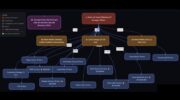From CBS news program 60 minutes, October 23rd, 1988. From If Americans Knew YouTube channel.
Journalist Mike Wallace reports that AIPAC set the tone for campaign donations to 80 pro-Israel pacs around the nation that gave candidates $6 million. Wallace interviews Senator Chuck Percy, John Chafee, George Ball about AIPAC.
A CBS poll showed that 72 percent of Americans felt Israel gets too much US tax money.
AIPAC head claimed: “‘All the Jews in America from coast to coast gathered to oust Percy, and the American politicians – those who hold public positions now and those who aspired – got the message.'”
Transcript:
MIKE WALLACE: There are very few lobbies working the corridors of Capitol Hill with as much clout as AIPAC, the American Israel Public Affairs Committee. They’re the people who tell the Congress which legislation affecting Israel they like and which they don’t. They are not agents of the Israeli government [this is disputed] but out of personal conviction as American Jews, they lobby the Congress and the administration for measures that support the State of Israel.
But the charge is that apart from lobbying, AIPAC also gets involved in election campaigns by setting the tone – the line – for about eighty pro-Israel political action committees around the country (pro-Israel PACs) that have given $6 million this year to a variety of candidates.
Senator John Chafee, Rhode Island
One race they’re focusing on is the senatorial contest in Rhode Island, where they say Republican Senator John Chafee has a poor record on Israel – and they want him out.
In Rhode Island, we tried to talk to Senator Chafee as he arrived at a state park celebration near Providence.
Senator Chafee had told us earlier that he would not agree to a formal interview about the subject of our report, but we have made clear to him and his press people that like any reporter covering any candidate, we felt free to ask questions at any of his public appearances.
“Why does AIPAC – why do the pro-Israel lobby find you so unfriendly?”
SEN. JOHN CHAFEE: “I’m not going to get into that, Mike, and you and I… we had the ground rules here.”
MIKE WALLACE: “Okay, but the governor and the senators…”
Rhode Island has a population of only a million, so a senatorial campaign here should be cheap. This year, it’s not.
Richard Licht
RICHARD LICHT: “Richard Licht, running for the US Senate. Help me out in November.”
MIKE WALLACE: Richard Licht, who is challenging Chafee, is the state’s lieutenant governor. He has also been an active member of the US Jewish community.
The money from pro-Israel PACs that Licht has received comes totally from out of state.
Altogether, almost $200,000 of the two and a half million he’ll be spending has been given by forty-five pro-Israel political action committees.
MIKE WALLACE: But add to that hundreds of thousands of dollars more from individuals all over the country, many of whom are tied to those same pro-Israel PACs.
Earlier this year, Senator Chafee had written to constituents attacking so-called outside forces who he said are pouring hundreds of thousands of dollars into the campaign, hoping to buy a seat in the United States Senate.
“Why?” asked the senator.
Chafee, as we said, had refused us an interview. Richard Licht did not.
MIKE WALLACE: “Richard Licht is hardly a household name in California, or Arizona, or Illinois, or Florida, and you’ve never voted in the Senate of the United States, so the question is how come these pro-Israel PACs know that you’re so reliable?”
RICHARD LICHT: “They know that Richard Licht can win this race for the Senate. Any candidate for the United States Senate raises a tremendous amount of their money from outside of their home state. You can look at any candidate. My opponent, John Chafee, has raised almost twice as much political action committee money as I have. He and I have both raised more money…”
MIKE WALLACE: “But not a penny from pro-Israel. Why? Is he against Israel?”
RICHARD LICHT: “I don’t believe he is, but you’d have to ask him what his position on that is.”
MIKE WALLACE: “Well, I shall.”
But that, as we had found out, was the only subject John Chafee did not want to discuss in public. In fact, on many key issues like aid for Israel, John Chafee, as he reminded some of his Jewish constituents in this Rhode Island synagogue, John Chafee has been a strong supporter of Israel.
His problem, though, is that he has not voted one hundred percent to demonstrate the political loyalty demanded by AIPAC and most pro-Israel PACs.
Example: Chafee voted against legislation that would have had the US government close down this PLO mission to the UN in New York, a measure the US courts later found to be unconstitutional.
But what irritated the pro-Israel PACs most were Chafee’s votes over the years to sell sophisticated military equipment like this AWACS surveillance aircraft to moderate Arab regimes like the Saudis, even though Chafee was on the record saying:
JOHN CHAFEE: “Israel’s military dominance in the area is not going to be altered by this sale. If it were to be ordered, I would not support the sale.”
Larry Goldberg
MIKE WALLACE: Several prominent Jewish Rhode Islanders like Republican Larry Goldberg have tried to convince the pro-Israel PACs that Senator Chafee deserves their backing.
LARRY GOLDBERG: “And I think that the exaggerated fundraising, you know, has really not been fair to his record.”
MIKE WALLACE: “What do you mean, ‘exaggerated fundraising?'”
LARRY GOLDBERG: “Well, we have raised hardly any money from the pro-Israel community.”
MIKE WALLACE: The Palestinian uprising against Israeli occupation and the headlines it has produced – all of that has hurt moderates like John Chafee, says Goldberg.
Why? Because it raises the anxiety level among pro-Israel Jews in this country and makes them anxious to find congressmen they can count on one hundred percent.
LARRY GOLDBERG: “And they may look more carefully at Senate races even far away from where they live, in order to see if there’s a candidate that they can support who will be more pro-Israel than the one that they have there now. And I think that’s the way that it plays out.
MIKE WALLACE: Inside this building of the headquarters of AIPAC, the American Israel Public Affairs Committee, they would not let us photograph inside their headquarters. AIPAC says it is the spearhead for support for Israel here in Washington. It is not a political action committee. It does not make campaign contributions but the clout of AIPAC here on Capitol Hill is legendary.
George Ball, US State Department
GEORGE BALL: “Practically every congressman and Senator says his prayers to the AIPAC lobby, though they’ve done an enormous job of corrupting the American democratic process.”
MIKE WALLACE: George Ball was number two in the State Department under Presidents Kennedy and Johnson, and he has never been reluctant to criticize the pro-Israel lobbies.
GEORGE BALL: “It’s the most effective lobby in the United States today, and I would put that ahead of the National Rifle Association.”
MIKE WALLACE: “What’s wrong with picking a candidate to support on the basis of the way that he has voted? Isn’t that the American way?”
GEORGE BALL: “I think it’s a caricature of the American way.”
Rabbi Israel Miller
RABBI ISRAEL MILLER: “The word ‘power,’ when it’s used for AIPAC, is a myth. It’s baloney. AIPAC is powerful only because the American people are behind Israel.”
MIKE WALLACE: Rabbi Israel Miller is a vice president of AIPAC.
“AIPAC is not anti-Chafee?”
ISRAEL MILLER: “No, AIPAC has put on the public record his votes on some of the issues that concern us, but we deal with a very politically aware and sophisticated group of people – the pro-Israel community – and they make up their own minds. You know…”
MIKE WALLACE: “You don’t direct them?”
ISRAEL MILLER: “We do not direct them.”
Secret AIPAC memos
MIKE WALLACE: “Let me read to you a memo – an AIPAC memo – November 3rd, 1987.
‘Senate race: Lieutenant Governor Richard Licht (Democrat – Rhode Island) is running against incumbent Senator John Chafee (Republican). Licht, who is Jewish, has a very good chance. Our problem is that the pro-Israel community is not excited and as forthcoming as they should be. We need to put the word out on this race, emphasizing Chafee’s poor record. The focus should be to generate interest for a terrific candidate to replace a poor supporter of our issue. See attached voting record and Marty’s analysis.’
It’s an AIPAC memo.”
ISRAEL MILLER: “Who signed it? [Pause] I don’t recognize it as an AIPAC memo.”
MIKE WALLACE: Rabbi Miller continued.
ISRAEL MILLER: “In this case, I think all that was being said was that Licht has a chance against an incumbent senator…”
MIKE WALLACE: “…who has a poor record. And we got to get the word out.”
ISRAEL MILLER: “His record is not as poor as some other senators.”
MIKE WALLACE: Shortly after that interview, AIPAC confirmed that the memo was in fact written by a former AIPAC political staffer. But they insisted she was a low-level employee and that her memo did not reflect AIPAC policy. And that’s important for AIPAC because under US federal election regulations, if it was shown that pro-Israel PACs were working in conjunction with AIPAC, or were coordinated by AIPAC, that would arguably be a violation of the law.
Well, shortly before this broadcast, 60 Minutes received in the mail from an anonymous sender another memo written by a high-level AIPAC official, Liz Schrayer, in which she urged a colleague to make certain that several pro-Israel PACs around the country funnel cash contributions to a handful of senatorial candidates. AIPAC officials acknowledged to us the memo was indeed an AIPAC document but they declined to answer any questions about it. They said in a statement that despite appearances to the contrary, AIPAC does not and does not have the power to direct fundraising decisions.
Senator Chic Hecht, Nevada
Now, who are other senatorial candidates in current races with what pro-Israel PACs call “poor” records on Israel?
Well, for instance, this year many pro-Israel PACs are trying to defeat incumbent Senator Chic Hecht of Nevada, even though he is Jewish, because he too did not follow the AIPAC line on weapon sales to the Arabs.
And there are many who charge that AIPAC, with its sights set only on Israel, is just too demanding of US politicians.
ISRAEL MILLER: “We aren’t demanding of US politicians. We have a concern about Israel which is understandable, particularly in this generation. Had you and I been in certain parts of Europe, we would have walked to Auschwitz together. We’re very sensitive about the security, about the future of Israel, and support of Israel means that we feel that it is in the interest, not merely of Israel, but also in the interest of the United States. Israel is a strategic ally of the United States.”
Chuck Percy
MIKE WALLACE: In recent years, AIPAC and the pro-Israel PACs have helped defeat, among others, Congressmen Paul Findley and Pete McCloskey, Senators Harrison Schmitt of New Mexico, Walter Huddleston of Kentucky, and Chuck Percy of Illinois. Like Senator Chafee, Percy too came out in favor of that sale of AWACS to the Saudis.
SENATOR CHUCK PERCY: “I finally reached the stage where, as chairman of the Foreign Relations Committee, I saw our foreign policy totally turned around. With a Muslim world – eight hundred million people – looking askance at the United States of America. What is happening, who is running the foreign policy… Can Israel and the Prime Minister have more power than the entire Senate of the United States or the President of the United States? And that, to me…I simply said, ‘Enough is enough.'”
MIKE WALLACE: That particular AWACS sail to Saudi Arabia did manage to pass the Congress, and in 1984 pro-Israel PACs and other individuals spent millions to unseat the powerful Senator Percy.
AIPAC head Tom Dine
“Let me just quote to you the words of the executive director of AIPAC, Tom Dine. After the defeat of Chuck Percy, a few years back, he said to a Jewish group in Toronto, quote:
‘All the Jews in America from coast to coast gathered to oust Percy, and the American politicians – those who hold public positions now and those who aspired, got the message.'”
ISRAEL MILLER: “It was an unfelicitous expression of that which Tom felt in his enthusiasm and in his zeal. I think if he had it to say all over again, he would have put it altogether differently.”
MIKE WALLACE: “Rabbi Miller, about a year ago the New York Times wrote: ‘AIPAC has become a major force in shaping US policy in the Middle East. [The organization] has gained the power to influence the presidential candidates’ choice of staff, to block practically any arms sale to an Arab country, and to serve as a catalyst for intimate military relations between the Pentagon and the Israel army.’
How did AIPAC become so powerful?”
ISRAEL MILLER: “Again, I’ll say that that’s very flattering, but it’s a myth. It’s just not so. The American people support Israel and therefore Congress votes as it does.”
Senator Daniel Inouye, Hawaii
MIKE WALLACE: One of Israel’s staunchest supporters is Senator Daniel Inouye of Hawaii, who says that AIPAC has nothing to do with his feelings about Israel.
SEN. DANIEL INOUYE: “If I can help Israel help herself in every instance, I’d do so. I’m also convinced it’s in our national interest. I’ve yet to see any country in that part of the world that is as reliable, as far as our strategic requirements are concerned, as Israel is.”
GEORGE BALL: “I don’t believe it’s an ally at all. We have no alliance with it. I mean, they insist on total freedom of action and they insist on our subsidizing their total freedom of action.”
MIKE WALLACE: The amount of that subsidy is remarkable and a testament to AIPAC’s clout on Capitol Hill. Altogether Israel gets more than $3 billion a year in assistance from the United States.
SEN. CHUCK PERCY: “Sometimes, the votes go through without a single debate involving billions of dollars. You couldn’t spend that kind of money in this country without a huge debate going on. But, a foreign government gets this money without debate because simply it’s just organized to get it.”
MIKE WALLACE: “Why does Israel get more aid – more US aid – than any other country in the world? $700 per Israeli per year, as opposed to $50 per Egyptian per year, as opposed to $2 per African per year.”
ISRAEL MILLER: “None of this money goes for…the $700…goes to raise the living standard of Israeli people. This is for their defense. This is for the security of Israel. If Israel were destabilized, the Arabs with all of their petrodollars and with all of their weapons would just sweep Israel into the sea.”
MIKE WALLACE: “Is there a possibility of a backlash if Israel is perceived as too powerful in the halls of government here in Washington?”
SEN. DANIEL INOUYE: “There’s always this possibility if people begin to believe that little Israel is calling the shots, then I’m certain Americans would resent that. They won’t want any country, big or small, to be calling the shots in the Congress of the United States. But I don’t think that AIPAC is calling the shots, as far as I’m concerned.”
MIKE WALLACE: “Is it common sense or cowardice on the part of senators who just don’t want to talk about this?
SEN. CHUCK PERCY: “Oh, I would say the Senators would say it’s just being practical.”
MIKE WALLACE: This past week, three major Jewish organizations took issue with AIPAC. The leaders of the American Jewish Committee, the American Jewish Congress, and the Anti-Defamation League of B’nai B’rith asserted in a letter to the President of AIPAC that AIPAC does not speak for the consensus of the organized Jewish community.
CBS News poll
And in a CBS News poll of 1,530 American adults two weeks ago, we asked: “Do you think that in order to preserve the security of Israel, the US should give Israel more aid than it gives any other country?”
13 percent said yes, 72 percent said no, 15 percent said they don’t know.
RELATED:
Remembering Mike Wallace, A Jew Unafraid of the Truth
When Mike Wallace questioned Israeli story of ’90 massacre, he got called into the owner’s office
Cbs Report on Aipac Viewed As Distorted, but Not Devastating




